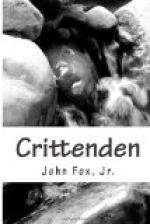always to end in defeat. At dusk, he heard the
word of the outer world from the lips of an old mountaineer
at the foot of the Cumberland—the first
heard, except from his mother, for full thirty days—and
the word was—war. He smiled incredulously
at the old fellow, but, unconsciously, he pushed his
horse on a little faster up the mountain, pushed him,
as the moon rose, aslant the breast of a mighty hill
and, winding at a gallop about the last downward turn
of the snaky path, went at full speed alongside the
big gray wall that, above him, rose sheer a thousand
feet and, straight ahead, broke wildly and crumbled
into historic Cumberland Gap. From a little knoll
he saw the railway station in the shadow of the wall,
and, on one prong of a switch, his train panting lazily;
and, with a laugh, he pulled his horse down to a walk
and then to a dead stop—his face grave
again and uplifted. Where his eyes rested and
plain in the moonlight was a rocky path winding upward—the
old Wilderness Trail that the Kentucky pioneers had
worn with moccasined feet more than a century before.
He had seen it a hundred times before—moved
always; but it thrilled him now, and he rode on slowly,
looking up at it. His forefathers had helped blaze
that trail. On one side of that wall they had
fought savage and Briton for a home and a country,
and on the other side they had done it again.
Later, they had fought the Mexican and in time they
came to fight each other, for and against the nation
they had done so much to upbuild. It was even
true that a Crittenden had already given his life
for the very cause that was so tardily thrilling the
nation now. Thus it had always been with his
people straight down the bloody national highway from
Yorktown to Appomattox, and if there was war, he thought
proudly, as he swung from his horse—thus
it would now be with him.
If there was war? He had lain awake in his berth
a long while, looking out the window and wondering.
He had been born among the bleeding memories of one
war. The tales of his nursery had been tales of
war. And though there had been talk of war through
the land for weeks before he left home, it had no
more seemed possible that in his lifetime could come
another war than that he should live to see any other
myth of his childhood come true.
Now, it was daybreak on the edge of the Bluegrass,
and, like a dark truth from a white light, three tall
letters leaped from the paper in his hand—War!
There was a token in the very dawn, a sword-like flame
flashing upward. The man in the White House had
called for willing hands by the thousands to wield
it, and the Kentucky Legion, that had fought in Mexico,
had split in twain to fight for the North and for the
South, and had come shoulder to shoulder when the breach
was closed—the Legion of his own loved
State—was the first body of volunteers to
reach for the hilt. Regulars were gathering from
the four winds to an old Southern battlefield.
Already the Legion was on its way to camp in the Bluegrass.
His town was making ready to welcome it, and among
the names of the speakers who were to voice the welcome,
he saw his own—Clay Crittenden.




